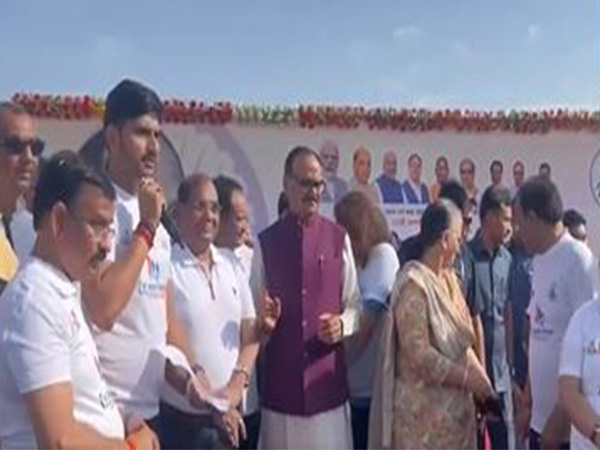"Prevention, preparedness, surveillance and joint responses are four pillars to achieve 'One Health'": V K Paul
Oct 26, 2023

New Delhi [India], October 26 : Four pillars to achieve One Health are "Prevention, Pandemic Preparedness, Integrated Surveillance, and Joint Responses," the NITI Aayog, member of Health Dr VK Paul said here on Thursday.
In the inaugural address NITI Aayog member, addressed the gathering by emphasising the importance of collective action.
He stressed the significance of targeted research and development, data sharing across systems and organisations, and the need to streamline regulatory systems for rapid pandemic response.
Paul highlighted the importance of partnerships, involving state governments, academia, the private sector, civil society, and pharmaceutical companies, to successfully achieve the One Health mission.
At the Public Health Summit, CII launched the vision report on One Health titled "The One Health Paradigm: Unifying Health for a Sustainable Future" in the presence of Paul, Roli Singh, Additional Secretary, MoHFW, Hari Menon Chairman CII Public Health Council and Director, BMGF, India Country office, Sourav Roy, Chief CSR, Tata Steel Ltd.
The report represents CII's collective commitment to the transformation of health in India. This report highlights key aspects of the One Health approach. It's an interdisciplinary strategy that acknowledges the interconnected nature of human, animal, and environmental health.
In today's ever-evolving world, health challenges have transcended boundaries and ecosystems, necessitating a transdisciplinary approach.
Acknowledging the profound interconnectedness between human health, animal health, plant health, and the shared environment, a collaborative approach that extends beyond individual departments and national borders has become essential.
In alignment with the Prime Minister's National One Health Mission, characterised by its cross-ministerial approach, the Confederation of Indian Industry (CII) organized the 4th Public Health Summit 2023 on October 26, 2023.
Roli Singh, Additional Secretary, Ministry of Health and Family Welfare, spoke about the need to organise the public health system effectively and respond to public health challenges with preparedness.
She emphasised the importance of a multidisciplinary approach that integrates climate action, public health initiatives, and equitable access to healthcare.
Singh noted that strengthening the healthcare system is a collaborative effort, involving state-level implementation and addressing various challenges such as food safety regulations, supply chain management, and animal husbandry.
Speaking at the summit, Hari Menon, Chairman, of CII Public Health Council and Director, India Country Office, BMGF, explained that One Health is a unifying framework that optimizes health for humans, animals, plants, and the environment.
It focuses on mobilizing resources across various sectors, disciplines, and communities to address collective needs, such as food security, safe water, green energy, and climate action.
He also added, working in silos can only create changes which are micro- intersectoral collaboration is the key to one health. Coming of 13 departments for One Health mission is exemplary and one-of-a-kind for India and the world.
Dr Abhijit Mitra, Animal Husbandry Commissioner at the Ministry of Fisheries, Animal Husbandry & Dairying, highlighted the historical connection between pandemics and animals, underscoring the importance of One Health.
Moreover, Sourav Roy, Chief CSR of Tata Steels Ltd, highlighted the essence of the One Health movement as a framework that unifies different aspects.
He stressed the need to break away from traditional methods and broaden horizons through collaborative principles and capital investment.
This summit, themed "The One Health Paradigm: Unifying Health for a Sustainable Future," provided a platform for thought leaders and experts to discuss the critical role of One Health in shaping a sustainable and healthier future.
The 4th CII Public Health Summit served as a vital platform for deliberating with multiple stakeholders - industry; academia, civil society and policymakers - on the One Health paradigm and its significance in shaping a sustainable and healthier future.

















